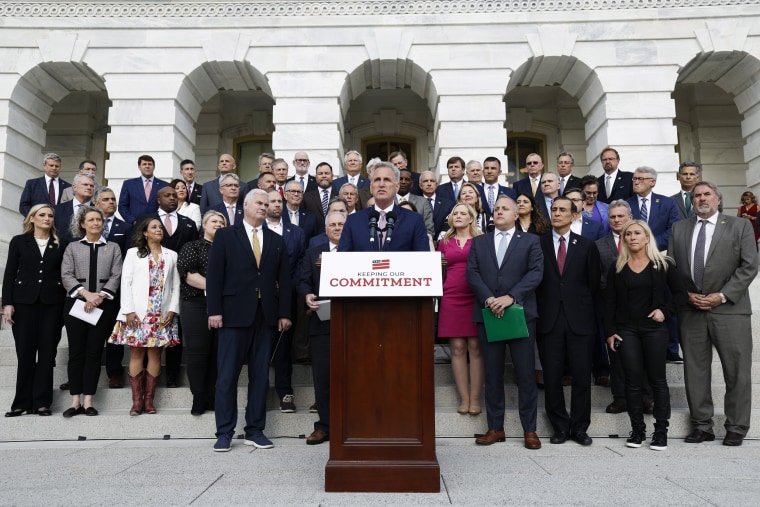Though House Republican leaders couldn’t quite get all of their members to support their far-right immigration bill last week, the party managed to approve the so-called “Secure the Border Act” late last week. For those concerned about good governance, this was not encouraging news.
As The Washington Post’s Greg Sargent explained, the House GOP’s bill “would impose many draconian restrictions on asylum applicants and reinstate Trump’s policy of forcing migrants to wait in Mexico for hearings, which produced humanitarian horrors. The White House and serious immigration analysts say this would end asylum seeking at the border as we know it and scrap existing legal protections for unaccompanied migrant kids.”
At first blush, it might be tempting to overlook the legislation, since there’s simply no way a Democratic-led Senate would even consider it, but its prospects don’t make the bill irrelevant. For one thing, the package makes it painfully clear just how regressive House Republicans’ immigration vision has become.
For another, some GOP lawmakers have an idea about how to get what they want anyway. Politico reported:
Key GOP lawmakers are signaling they want border policies in the mix as congressional leadership and the White House try to negotiate a debt ceiling deal, the day after Republicans passed a sweeping border and immigration bill. It was a GOP wishlist that included restarting construction of the U.S.-Mexico border wall and placing new restrictions on asylum seekers.
Republican Rep. Chip Roy, for example, said that he believes his party’s far-right immigration package “is now a central part of any debt ceiling or spending debate for the remainder of the year.” The Texan added that other GOP members agree with him that the issue is now part of the debt ceiling process.
Politico’s report went on to note that Republican Rep. Garret Graves of Louisiana — a top deputy to House Speaker Kevin McCarthy, especially as part of the debt ceiling process — pointed to the immigration bill and said his GOP colleagues are “bringing more ideas to the table.”
A few days earlier, Sen. Josh Hawley said he wants to make an addition of his own: As a condition for raising the debt ceiling, the Missouri Republican wants to see the U.S. impose new tariffs on China.
At this point, we could spend a few paragraphs evaluating proposals like these on the merits, but let’s not miss the forest for the trees.
First, the debt ceiling “x-date” could come as early as June 1, and as the deadline draws closer, Republicans, instead of taking constructive steps toward diffusing the default bomb they created, are looking for new ways to make their ransom note worse.
In other words, as the prospect of “financial Armageddon“ nears, GOP officials are actively exploring ways to make a catastrophe more likely, not less.
Second, if rank-and-file House Republicans, as behind-the-scenes talks continue, are making new demands, it raises fresh questions about whether GOP leaders will be able to pass some kind of compromise, should it come together. And if Democrats don’t believe McCarthy can deliver the votes needed to pass a negotiated solution, what’s the point in talking to him at all?
And third, as we discussed last week, it’s important that Americans understand that Republicans, unsatisfied with their own country’s governing model, feel increasingly justified in doing an end run around the U.S. policymaking process. Instead of bothering with the Madisonian system that’s existed for more than two centuries, GOP officials see value in an alternative system in which they get what they want through extortion.
Daniel Pfeiffer, a veteran of the Obama White House, wrote in a New York Times op-ed last week, “This time it’s spending cuts and work requirements for Medicaid recipients. What happens when the debt limit comes up again next year? Will the Republicans demand a federal abortion ban? A pardon for the Jan. 6 perpetrators?”
In the days that followed, the dynamic worsened: In exchange for agreeing to pay the nation’s bills this year, some GOP lawmakers also want a right-wing immigration package and new trade tariffs. By this afternoon, other Republicans might have even more ideas about the demands on their ransom note.
Why wouldn't they?
This is what happens when a political party abandons their country’s system of governing. They know a democratically elected president and Senate majority disapprove of their ideas, so Republicans intend to get their way anyway by simply threatening to harm Americans on purpose unless their demands are met.
Why bother with the slow and exasperating Madisonian system of government when this radical alternative is so much more efficient? Why work through the country’s longstanding legislative process when extortion makes it more likely that Republicans can get what they want by threatening Americans’ wellbeing?

